
Who We Are
Seniors Care Network is responsible for the organization, coordination and governance of specialized geriatric services (SGS) in the Central East Region of Ontario Health East.
Key services include the planning, design, implementation, evaluation, quality improvement, and performance monitoring of SGS. Applied health research is a key component of Seniors Care Network’s mandate. Additionally, subject matter expertise is provided to partner organizations including Ontario Health Teams.
What's New
A Framework for Addressing Racism in Specialized Geriatric Services
In response to the reports of racism experienced by our specialized geriatric services (SGS) colleagues, Seniors Care Network convened an Equity, Diversity and Inclusion Task Group in June 2020. The Task Group developed an action-oriented framework for addressing racism in Specialized Geriatric Services. An updated version of the framework is now available.
2025 GAIN ROI Evaluation Report
Seniors Care Network led a comprehensive Return on Investment (ROI) evaluation to measure the clinical and financial impact of the Geriatric Assessment and Intervention Network (GAIN), a regionally coordinated program that provides specialized, interprofessional care for older adults living with frailty and dementia.
Using a multi-pronged approach, the evaluation combined administrative data, chart reviews, ad hoc interventions data, and client, care partner, and provider surveys to assess outcomes across GAIN.
The analysis identified more than $23 million in annual system benefits, primarily through avoided long-term care placements, reduced falls/falls risk, ED avoidance/diversion, and safer medication use. This resulted in an overall ROI of ~150%, indicating that for every dollar invested, the program generated $1.50 in measurable system cost avoidance.
These findings demonstrate that GAIN provides both measurable economic return and improved quality of care for older adults and their caregivers.
Falls Prevention and Management in the Community
Falls are a leading cause of injury among older adults. This resource is intended to guide the implementation of proactive falls screening and management for older adults across community settings, including, community services, outpatient and outreach clinics, hospital ambulatory services, etc.
It proposes a 4-step, evidence-based approach that emphasizes early detection, holistic assessment, and timely connections with specialized geriatric and community-based rehabilitative services.

%20(24%20x%2018%20in).png)




